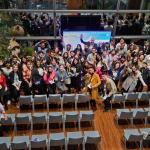The landscape of work is undergoing a seismic transformation, driven by the relentless pace of digital change and emerging technologies like generative AI. So how can businesses adapt to harness new skills, solve the talent gap and leverage the opportunities that lie ahead?
The pace of change in today’s world is nothing short of breathtaking. Groundbreaking technologies like generative AI are rapidly being adopted, reshaping the way we work and collaborate on what feels like an almost daily basis.
It means that the existing, well-documented digital skills gap looks set to widen. For example, according to Salesforce research, 60% of global workers reported excitement about the prospect of using generative AI for their job, yet only one in 10 have the necessary skills to use it in the workplace. On top of this, the tech skills that are being learnt now may well have a very short shelf-life – as little as two and a half years in some domains, according to a recent Harvard Business Review article.
As a result, businesses are facing a significant pain point. When tech changes so quickly, how can they access the skilled workforce they need to keep on top of the curve?
Multifaceted Approach
Without a doubt, the only way to make meaningful inroads is a multifaceted approach. The starting point for companies is to invest in their current staff and future-proof their workforce. This means identifying the skills needed for the future, conducting an audit of the skills people already have, and then designing learning programs that bridge the gap. It might combine comprehensive skills surveys to get a granular understanding of what needs improving, open dialogues with teams to gain an insight into the perceived gaps faced on the ground, and/or tracking industry trends to pinpoint emerging skills that could be lacking.
In short, it needs to be a holistic assessment that will equip businesses to make informed decisions on how to upskill employees.
Next, it’s time to look at recruitment processes. While it may be challenging to upskill internally, it can be just as difficult to locate and hire professionals who possess up-to-date skills and knowledge in the right areas. Something that exacerbates the issue is that companies often insist on several years of experience. But given the speed of tech change, such people often don’t exist.
It begs the question, do we need to stop using time as a yardstick for experience when it comes to hiring? The short answer is yes. Or at least we need to re-think what constitutes experience. For example, working within the Salesforce ecosystem for 10 years brings a raft of professional benefits in terms of problem-solving and navigating unexpected barriers, but it doesn’t necessarily equate to someone’s technical knowledge being entirely up-to-date. What’s often more important is that people are able to demonstrate the right attitude, as well as hard and power (or soft) skills and that employers give someone’s lived experience the weight it deserves.
Celebrating Individual Progress
This brings us to another key issue – the fact that individuals have a role to play in taking charge of their own development. Professionally developing yourself in a time of dramatic change is absolutely critical to surviving the transitions that we’re going through. Many L&D functions have long embraced a 70:20:10 model, emphasising self-directed learning (10%), and mentoring and coaching (20%), as well as on-the-job learning (70%) when it comes to honing skills.
As people learn in different ways, at different paces and at different times, an element of self-paced learning is often advantageous. Online learning platforms like Trailhead can be accessed at any point by anyone with a passion for how digitisation can drive change, and there are plenty of celebratory milestones to keep motivation levels high. Trailhead Coach can also help by offering a step-by-step pathway for individuals pursuing a career in the Salesforce ecosystem.
However, it’s crucial to remember that mastering tools like Salesforce goes beyond technical proficiency – it’s about unlocking power skills too. Things like critical decision-making, agility, continual learning, and resilience are the very traits that empower individuals to navigate ever-evolving and unpredictable digital transformations. Power skills training can be helpful (and Trailhead contains many trails that address these) but again, there’s no substitute for lived experience.
Values of Broad Skill Sets
Talking about broader skill sets, there are clear business benefits to closing the digital skills gap by actively seeking out diverse talent. Varied backgrounds naturally yield diverse viewpoints, allowing teams to problem-solve creatively and think up fresh approaches. But as well as unique perspectives, diverse individuals often possess a range of skills beyond the technical, such as cultural awareness, empathy, and communication abilities.
In fact, what’s genuinely exciting about future-proofing businesses in this era of change is the potential to be more than just a mechanism for profit. There’s an opportunity to become a platform for change, and leverage pools of talent that may have previously been overlooked. For instance, veterans, refugees and those forcibly displaced have often demonstrated incredible resilience in the face of extreme adversity, and yet this hasn’t always been recognised as the power skill that is it.
At Salesforce, we’re trying to lead the way, doubling down on efforts to help people reskill and adapt to the evolving demands of the future. Diversity programs, partnerships with organisations supporting refugees and veterans, and initiatives for equity and inclusion underscore the commitment to leveraging business as a force for positive change. With initiatives such as Tent.org supported by so many companies, we know we can collectively make a big social impact.
Looking Forwards
So, in the midst of an ever-accelerating digital evolution, businesses find themselves at a crossroads. The swift pace of change, coupled with a widening skills gap, presents a formidable challenge, but also an opportunity for transformation.
By proactively investing in their teams, fostering a culture of learning and adaptation, and looking beyond traditional definitions of experience, there’s collective room for businesses to harness new skills and address the talent gap. But there’s also an individual responsibility for Trailblazers to seize the opportunity to develop power skills and lead the charge towards a future that remains ever-shifting but rife with potential. As always, it’s a reminder that change is the only constant and, by embracing these changes and new ways of working, there’s a way to thrive, not just survive.
Find out more about topics in this blog, including reskilling in the age of AI, power skills and how to make change stick, with these resources:
- Awesome Admin
- Fox Agency podcast
- Salesforce Honors World Refugee Day; Partners with Tent.org to Empower Displaced Individuals
- How Celebrating Milestones with Trailhead Benefits Your Business and Career
- Is It Time to Re-Imagine How We Define Experience?
- Want to make change stick? The secret is knowing the ‘why’. (Part 1)
- Why outcome-led work is the foundation of effective change management design (Part 2)
- How learning drives capability, capacity and culture in change management (Part 3)
- Reskilling in the Age of AI
Trailhead – The fun way to learn
Everyone can learn Salesforce. Whether you are an admin, user, or developer, there is a trail for you.


























